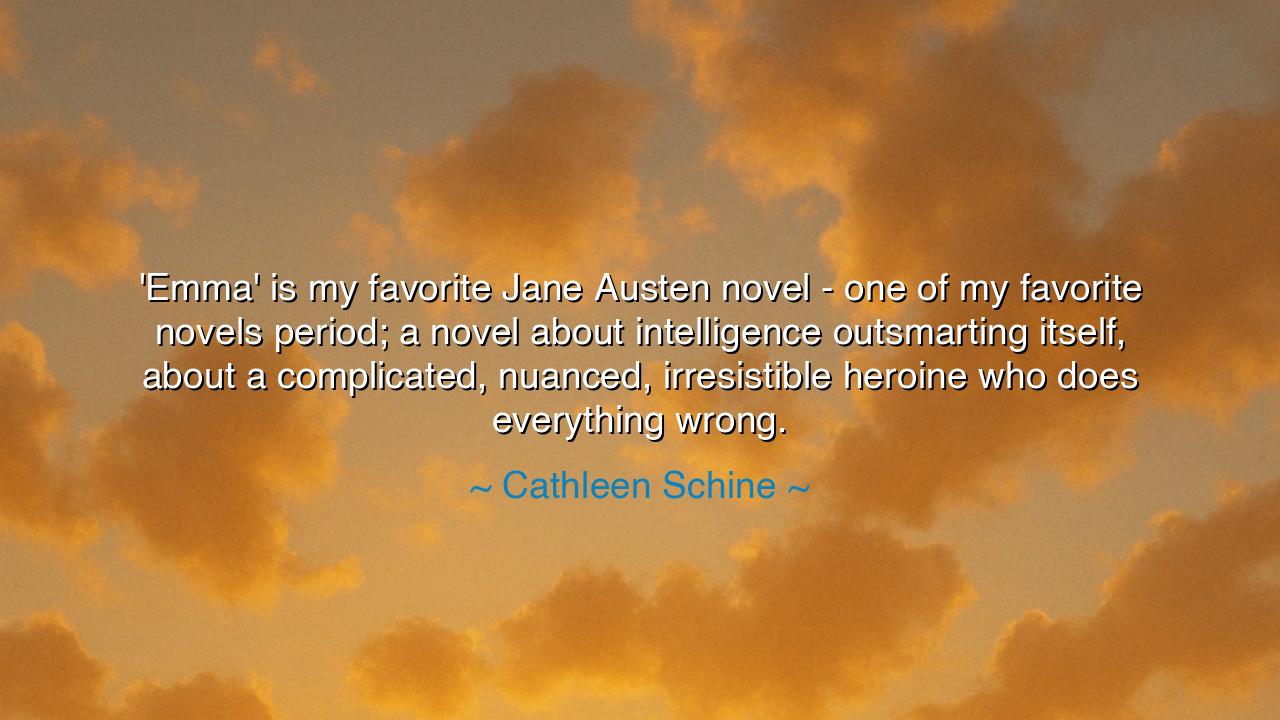
'Emma' is my favorite Jane Austen novel - one of my favorite
'Emma' is my favorite Jane Austen novel - one of my favorite novels period; a novel about intelligence outsmarting itself, about a complicated, nuanced, irresistible heroine who does everything wrong.






Hearken, children of reflection, and attend to the words of Cathleen Schine, whose admiration illuminates a timeless tale: “'Emma' is my favorite Jane Austen novel—one of my favorite novels period; a novel about intelligence outsmarting itself, about a complicated, nuanced, irresistible heroine who does everything wrong.” Pause upon these words, for they reveal a profound meditation on the paradox of the human mind: that intelligence, though brilliant, may falter when untethered from humility and self-awareness, and that the path to wisdom is often marked by missteps and folly.
Schine begins with the recognition of intelligence outsmarting itself, a theme central to Jane Austen’s Emma. The heroine, clever and perceptive, endeavors to guide the lives of those around her, yet her schemes often misfire. This mirrors the ancient understanding that intellect, without temperance and reflection, may become a source of confusion rather than clarity. The mind’s brilliance must be guided by prudence, lest it lead not to insight but to misjudgment.
History and legend offer mirrors of this principle. Consider the tale of Icarus, whose ingenuity in crafting wings enabled flight, yet whose lack of prudence led him too close to the sun. Like Emma, the gifted intellect can soar, yet without humility and awareness, it risks folly. Schine’s insight captures the enduring truth: intelligence is powerful, but its power must be married to self-knowledge and moral discernment.
Even in the realm of leadership, this paradox is evident. Leaders with keen intellect may miscalculate or overreach when their confidence eclipses reflection. Napoleon Bonaparte, whose brilliance reshaped Europe, ultimately faced ruin when strategy outstripped prudence. Emma reminds us, through the lens of fiction, that even the most astute minds are fallible, and that charm, intelligence, and good intention do not guarantee success or clarity.
The essence of Schine’s reflection lies in the embrace of complexity. Emma, the complicated, nuanced, irresistible heroine, embodies the contradictions of human nature. She is clever yet misguided, earnest yet flawed, embodying the truth that wisdom emerges not from perfection, but from the continual process of learning, misjudgment, and reflection. The ancients understood that growth is forged in trial, error, and the courage to confront one’s own limitations.
Practical wisdom emerges from this reflection. Cultivate intelligence, but temper it with humility and the willingness to listen, observe, and learn from mistakes. Embrace complexity in yourself and others, recognizing that missteps are not signs of failure but opportunities for insight. The mind, like Emma, may do everything wrong at times, yet each misjudgment carries the seeds of understanding, empathy, and personal growth.
Moreover, the novel reminds us of the enduring power of reflection and redemption. Emma’s journey is one of self-discovery, the awakening to her own limitations, and the reconciliation of intellect with wisdom. Schine’s admiration highlights that literature, like life, teaches that the human spirit grows not in perfection, but through engagement with error, self-awareness, and the pursuit of moral and emotional insight.
Therefore, generations to come, remember Cathleen Schine’s counsel: intelligence outsmarting itself is not a flaw to fear but a lesson to embrace. Cultivate your mind, welcome complexity, learn from missteps, and temper intellect with reflection and humility. In doing so, you honor both the power and the limits of human intelligence, nurturing a life rich in wisdom, compassion, and the enduring capacity to grow through the art of error.
If you wish, I can also craft a more poetic, allegorical version of this reflection, portraying Emma as a luminous figure navigating the labyrinth of intellect and folly, suitable for dramatic or meditative narration. Do you want me to do that?






AAdministratorAdministrator
Welcome, honored guests. Please leave a comment, we will respond soon